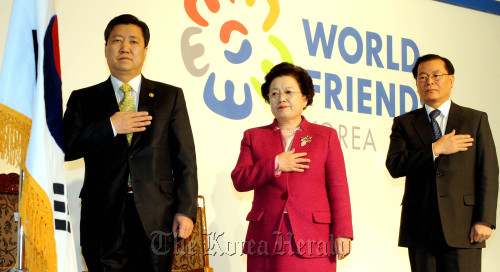Scholars, volunteers and officials gathered at a forum in Seoul Tuesday to discuss the past, present and future of overseas volunteering, hoping to increase the efficiency of Korea’s aid.
Participants at the World Friends Korea Forum reviewed the current situation for volunteers and organizations to seek the direction in which Korea is going as a provider of official development aid.
World Friends Korea, a homebrewed international volunteering program modeled after the U.S. Peace Corps, was created in 2009 as an effort to streamline overseas volunteering and unify volunteer programs among different ministries, including the Public Administration and Security Ministry and the Education, Science and Technology Ministry.
 |
International Cooperation Agency, Presidential Council on Nation Branding chairwoman Lee Bae-yong (center) and Vice Foreign Minister Min Dong-seok kick off the World Friends Korea Forum in Seoul on Tuesday. (Park Hyun-koo/The Korea Herald) |
The forum was also attended by Park Dae-won, president of the Korea International Cooperation Agency, Presidential Council on Nation Branding chairwoman Lee Bae-yong and Vice Foreign Minister Min Dong-seok kick off the World Friends Korea Forum in Seoul on Tuesday.
Cho Won-ho, KOICA vice president, addressed the future of overseas volunteering with an outline of short- to long-term plans to further its efforts throughout the world.
Cho said Seoul plans to dispatch more than 4,000 volunteers to the poorest and most underdeveloped countries, maintaining its base in Asia and expanding its efforts in the American and African continents.
To heighten interest in overseas volunteering and streamline the process from applicant to volunteer, the WFK will overhaul its recruiting system into a one-stop location for all private and public organizations, including KOICA and the National Research Foundation of Korea.
He said a national infrastructure for volunteers is necessary, and there is a “desperate” need for a new education center to train pre-departure volunteers, which will offer education according to their field and length of stay.
A network among veteran and short-term volunteers will be created, offering a channel to exchange knowledge on-scene and a chance for natives to see the “result of integrated implementation,” Cho said.
However, there were some shortcomings on the part of WFK.
According to the Dean of Academic Affairs at Namseoul University, Lee Seong-chul, the biggest challenge that young volunteers face in the field is inability to understand the ultimate goal ― that the program is there to teach them ― and tendency to fall into an “absence of identity syndrome.”
Lee also believed that the field of volunteer projects must be expanded to address more areas of need.
Other criticism arose about the difficulty past volunteers currently have in utilizing their experience as a volunteer, which Lee hopes to change in the future.
The U.S. Peace Corps considers all volunteers who have served their minimum two years in the program non-competitive for government positions as long as they meet the minimum qualifications.
Lee mentioned many of the changes that Cho had addressed already, including the lack of pre-dispatch education and the need to emphasize cultural exchange.
Among the organizations under the WFK banner was the Korean University Council for Social Service, which sent more than 5,000 students to more than 20 countries for up to three weeks.
KOICA, founded in 1991 and also a WFK organization, has supported more than 45 developing countries with long-term projects and has provided training to some 25,000 participants from 164 countries since its establishment.
Korea is the only country to have stopped needing Peace Corps assistance and stayed that way. Korea received aid in the 1960s from U.S. volunteers including now U.S. Ambassador to Seoul, Kathleen Stephens.
“When people go to volunteer they look to help others, but realize in the end that others have helped them, giving them a positive outlook on life and broadening their horizons,” Lee told The Korea Herald when asked about the importance of volunteering for Koreans.
By Robert Lee (
rjmlee@heraldcorp.com)








